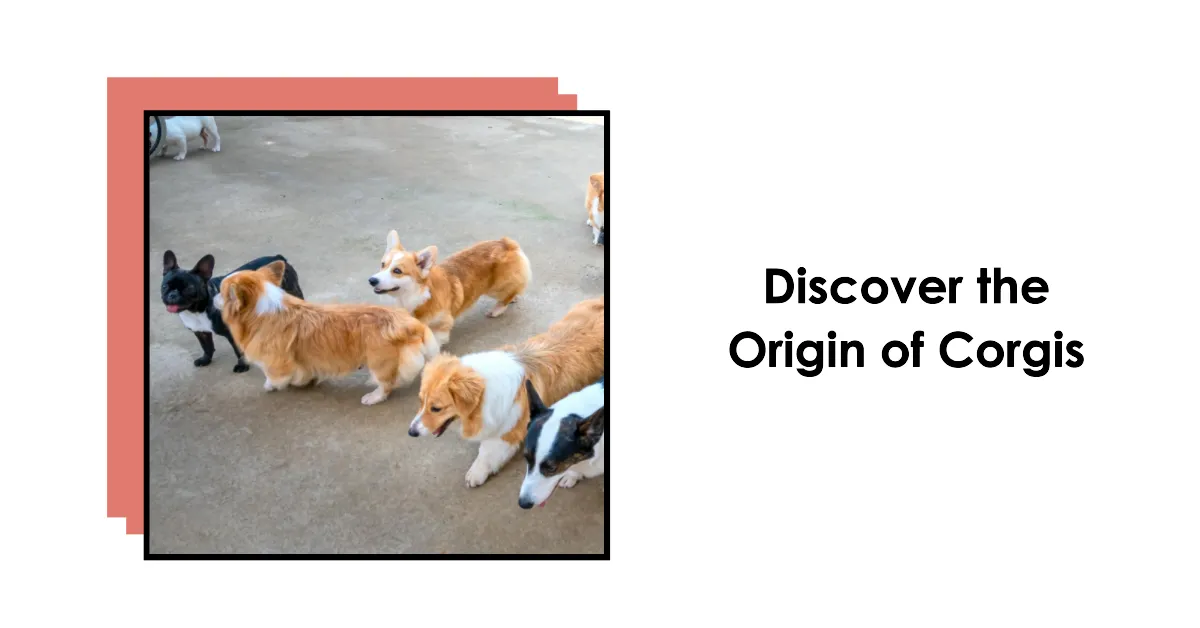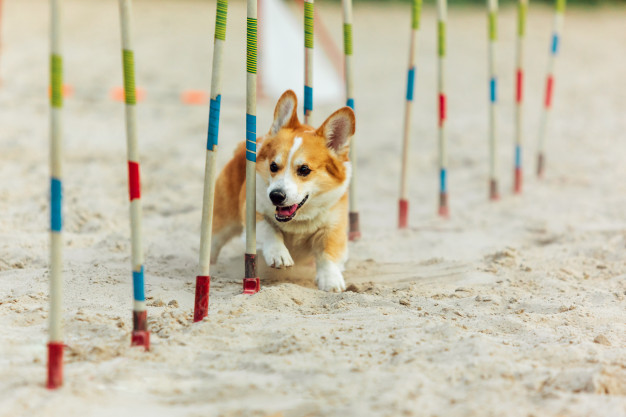Walks: Key to a Healthy and Happy Corgi

Imagine your corgi's little paws hitting the pavement, tail wagging in excitement as they explore the world around them. Walks are not just a simple stroll, but a vital key to keeping your furry friend healthy and happy.
Not only do they provide physical exercise, but they also help with weight management, mental stimulation, and socialization opportunities. Plus, walks offer valuable bonding time between you and your corgi, strengthening your relationship.
By taking your corgi for regular walks, you can also effectively manage their behavior and reap the numerous health benefits associated with this simple activity.
So lace up those shoes and grab the leash, because walks are the secret to a thriving and content corgi!
Physical Exercise
To ensure your Corgi maintains a healthy and happy lifestyle, it's crucial for you to provide regular and sufficient physical exercise. Outdoor activities and playtime routines are essential for keeping your furry friend in top shape. Not only will exercise help your Corgi burn off excess energy, but it also promotes good cardiovascular health and prevents obesity.
Regular walks are a fantastic way to get your Corgi moving and engaged with the world around them. You can take them on leisurely strolls through the neighborhood or explore nature trails together. Remember to vary your routes to keep things interesting and stimulating for your furry companion.
Additionally, incorporating playtime routines, such as fetch or tug-of-war, will further enhance their physical well-being. So, get out there and have fun while keeping your Corgi fit and happy!
Weight Management
Maintaining a healthy weight for your Corgi involves managing their food intake and engaging in regular exercise. Here's what you need to know about weight management for your furry friend:
- Healthy Diet: Start by feeding your Corgi a balanced and nutritious diet. Choose high-quality dog food that's appropriate for their age and size. Avoid feeding them table scraps or unhealthy treats, as these can contribute to weight gain.
- Portion Control: It's important to measure your Corgi's food and feed them appropriate portions. Avoid free-feeding, as this can lead to overeating. Follow the feeding guidelines provided by the dog food manufacturer and consult with your veterinarian if you're unsure about the right amount to feed.
- Regular Weigh-ins: Monitor your Corgi's weight regularly to ensure they're staying within a healthy range. If you notice any significant weight gain or loss, consult with your veterinarian for guidance.
- Exercise: Along with a healthy diet, regular exercise is crucial for weight management. Take your Corgi for daily walks, engage in interactive play sessions, or consider agility training to keep them active and burn off excess calories.
Mental Stimulation
Alright, let's talk about mental stimulation for your corgi.
One way to keep their minds sharp is by using puzzle toys. These toys challenge them to figure out how to get a treat or a toy out of a particular contraption.
Another great way to stimulate their brains is through training. Teaching them new tricks and commands not only keeps their minds active but also strengthens your bond.
Lastly, socialization is crucial for their mental well-being. Interacting with other dogs and people helps them learn how to navigate different social situations.
Puzzle Toys for Corgis
Engaging your Corgi with puzzle toys provides mental stimulation. Not only do these toys keep your furry friend entertained, but they also help exercise their problem-solving skills.
Here are four reasons why puzzle toys are a must-have for your Corgi:
- Interactive feeding: Puzzle toys can be used as a fun way to feed your Corgi. By hiding treats or kibble inside the toy, your Corgi will have to figure out how to access the food, keeping their minds active during mealtime.
- Problem-solving: Puzzle toys challenge your Corgi to think and problem-solve. They'll have to figure out how to manipulate the toy to retrieve the hidden treats, which can help keep their minds sharp.
- Mental stimulation: Corgis are intelligent dogs that thrive on mental stimulation. Puzzle toys provide a great outlet for their natural curiosity and can prevent boredom and destructive behavior.
- Safety: Puzzle toys are designed with your Corgi's safety in mind. Look for toys made from durable materials that can withstand chewing and ensure that any small parts or pieces are securely attached to prevent choking hazards.
Investing in puzzle toys for your Corgi isn't only a great way to keep them entertained but also promotes mental well-being and problem-solving skills. So go ahead and treat your furry friend to some brain-teasing fun!
Training for Mental Agility
To enhance your Corgi's mental agility and provide mental stimulation, incorporate training exercises into your routine walks. Brain games and cognitive challenges are great ways to keep your furry friend's mind sharp and engaged.
During your walks, you can work on simple commands like sit, stay, and come. These exercises not only reinforce good behavior but also help your Corgi develop problem-solving skills and focus.
You can also try incorporating interactive toys or puzzles into your walks. These toys provide mental stimulation and encourage your Corgi to think and problem-solve while on the move.
Importance of Socialization
Continue to prioritize your Corgi's mental stimulation through socialization during your walks. Socialization is crucial for your furry friend's overall well-being and happiness. Here's why:
- Improved behavior: Regular exposure to different people, animals, and environments helps your Corgi develop better social skills, reducing the chances of aggression or fear-based behaviors.
- Boosted confidence: Interacting with other dogs at dog parks or during walks builds your Corgi's confidence, making them more comfortable in various situations.
- Prevention of anxiety: Proper socialization from an early age helps prevent anxiety and fear-related issues in your Corgi, ensuring a calmer and more relaxed pet.
- Long-term benefits: Socialization lays the foundation for a well-adjusted adult dog, making future training and introductions to new experiences much easier.
Socialization Opportunities
Now, let's talk about the various socialization opportunities that you can provide for your Corgi.
Take your furry friend to the park for some playdates with other dogs. Not only will this help them learn how to interact with different breeds, but it will also provide them with much-needed exercise.
Another option is to consider bringing your Corgi to a doggy daycare, where they can socialize and play with other dogs under the supervision of trained professionals.
Lastly, enrolling your Corgi in training classes is a great way for them to interact with other dogs and humans while learning new skills.
Park Playdates
Engaging in park playdates provides corgis with valuable socialization opportunities. Taking your furry friend to the park not only allows them to burn off some energy, but it also gives them a chance to meet and interact with other dogs. Here are four reasons why park playdates are beneficial for your corgi's social development:
- Learning proper doggy etiquette: Interacting with different dogs helps your corgi understand how to behave in social settings, such as not jumping on others or respecting personal space.
- Building confidence: Meeting new dogs and people can boost your corgi's confidence, making them more comfortable in various situations.
- Improving communication skills: Through play, corgis learn how to express themselves effectively, using body language and vocalizations to communicate with other dogs.
- Reducing anxiety: Regular park playdates can help reduce anxiety and fearfulness in corgis by exposing them to new experiences and environments.
Doggy Daycare Visits
When it comes to socialization opportunities for your corgi, nothing beats regular visits to a doggy daycare. Doggy daycares provide a safe and controlled environment where your furry friend can interact with other dogs and humans. It's like a playground for your corgi! They get the chance to make new friends, learn proper socialization skills, and burn off some energy in a supervised setting.
Plus, doggy daycares often have playgroups where dogs are grouped based on size and temperament, ensuring a positive and safe experience for everyone. It's important to choose a reputable doggy daycare that follows strict safety protocols, so you can have peace of mind knowing that your corgi is in good hands.
Training Classes Attendance
To further enhance your corgi's socialization skills, consider attending training classes, where they can learn and interact with other dogs and humans in a structured environment. Training classes provide a fantastic opportunity for your corgi to develop good behavior and manners while being around different types of dogs and people.
Here are four reasons why training classes are beneficial for your furry friend:
- Professional guidance: Trainers can teach you effective training techniques and help you understand your corgi's behavior better.
- Positive reinforcement: Training classes focus on positive reinforcement, using rewards to encourage desired behaviors. This approach ensures a safe and loving environment for your corgi to learn and grow.
- Socialization: Your corgi will have the chance to interact with other dogs, helping them become well-rounded and comfortable in various social situations.
- Structure and consistency: Training classes provide a structured setting, giving your corgi consistent instructions and expectations to follow.
Bonding Time
Spend quality time with your Corgi through regular walks to strengthen your bond. Not only are walks a great way to exercise your furry friend, but they also provide an opportunity for both of you to connect on a deeper level.
As you stroll through the neighborhood or explore the great outdoors, engage in playtime and outdoor activities that your Corgi enjoys. This could include playing fetch, running together, or even just taking a moment to sit and enjoy the scenery.
By participating in these activities together, you aren't only improving your Corgi's physical health, but you're also building trust and creating lasting memories.
Behavior Management
During your walks with your Corgi, you can effectively manage their behavior by establishing clear boundaries and reinforcing positive habits. Here are some tips to help you with behavior management:
- Use positive reinforcement: Reward your Corgi with treats or praise when they exhibit good behavior, such as walking calmly beside you or not pulling on the leash. This will encourage them to continue behaving well.
- Practice leash training: Teach your Corgi to walk on a loose leash by using gentle corrections and guiding them back to your side when they start to pull. Consistency is key in helping them understand what's expected of them.
- Set boundaries: Establish rules for your Corgi during walks, such as not allowing them to jump on people or chase after squirrels. Enforce these boundaries consistently to prevent any potential safety hazards.
- Be patient: Behavior management takes time and consistency. Stay calm and patient with your Corgi, and remember to always focus on reinforcing positive habits rather than punishing unwanted behavior.
Health Benefits
Regular walks with your Corgi offer numerous health benefits that can contribute to their overall well-being. Not only do these walks help your furry friend stay physically fit, but they also provide longevity benefits. By engaging in regular exercise, your Corgi can maintain a healthy weight, which reduces the risk of obesity-related health issues such as diabetes and joint problems.
Additionally, walks help to strengthen your Corgi's cardiovascular system, improving their heart health and increasing their lifespan. But it's not just physical health that benefits from walks; they also provide stress reduction. Walking allows your Corgi to explore their surroundings, alleviate boredom, and release pent-up energy, which can lead to a calmer and happier dog.
Frequently Asked Questions
How Often Should I Walk My Corgi?
You should walk your corgi regularly to maintain their health and happiness. A consistent corgi walking schedule will bring many benefits, like keeping them fit, improving their mental stimulation, and preventing behavior problems.
Can I Use a Treadmill as a Substitute for Outdoor Walks?
Using a treadmill as a substitute for outdoor walks is a great idea! It provides indoor exercise options for your corgi. Just make sure to introduce it gradually and monitor your pup's safety.
What Should I Do if My Corgi Refuses to Go on Walks?
If your corgi refuses to go on walks, don't worry! Try using positive reinforcement and training methods to encourage them. Behavioral issues can be addressed with patience and consistency. Remember, walks are important for their health and happiness!
Are There Any Specific Walking Techniques or Strategies That Can Help Improve My Corgi's Behavior on Walks?
To improve your corgi's behavior on walks, try using walking techniques for leash training. Keep them engaged by using strategies like treats, toys, and positive reinforcement. These will make your walks enjoyable and help keep your pup safe.
Are There Any Alternative Forms of Exercise That Can Provide Similar Benefits to Walking for My Corgi?
Looking for alternatives to walking for your corgi? Indoor activities like playing with interactive toys can provide similar benefits. Keep your furry friend entertained and active while ensuring their safety indoors.











